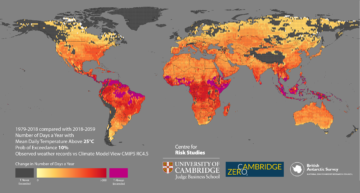Education

Thursday, March 12, 2020 “Cambridge University is an amazing cauldron of very talented people.” So says Dr Maria Russo, who is a Research Associate in our Centre for Atmospheric Science, where she studies the physical and chemical processes at work in the atmosphere. Here, she tells us about the links between climate and air pollution, the…
The Cambridge Institute for Sustainability Leadership (CISL) are supporting partners of The Economist’s Sustainability Summit. This year the focus is on scaling up action to respond to climate change.

Photo of solar panels by Mariana Proença on Unsplash Monday, March 2, 2020 A technique based on the principles of MRI and NMR has allowed researchers to observe both how next-generation batteries for large-scale energy storage work, but also how they fail, aiding the development of strategies to extend battery lifetimes. Being able to extend…
In January the Banking Environment Initiative launched a new report, Bank 2030. The study outlines the role of the banking sector in tackling climate change and details how individual banks can accelerate the transition to a low carbon economy. This webinar will offer a deeper understanding of the context and vision of the Bank 2030…

Climate change could add around 20% to the global cost of extreme weather events by 2040, according to early findings from Cambridge researchers. The findings come from the Cambridge Climate …

Slideshow image: Featured image: Image caption: The climate crisis: towards zero carbon Image link: The climate crisis: towards zero carbon Sort order: 1
February 2020: Accelerated ice loss in Greenland corresponds to the IPCC high-end climate scenario and identifies warming oceans and warmer air temperatures as primary catalysts. Melting ice will cause sea levels to rise, which, in turn, exposes more coastal communities to flooding, hurricanes, and storm surges. It strengthens calls to mitigate climate change and limit…
February 2020: Offshore renewable energy generation may impact negatively on marine life due to construction or operation noise in combination with risks of blunt trauma from blades, which increases risks for marine life when hunting or navigating. Researchers are calling for improved designs and strategic trade-offs between marine conservation efforts and a transition towards 100%…

Ice Floor by British artist Wayne Binitie Ice Floor, a new Arup Phase 2 commissioned installation about climate change. A piece by UK born artist Wayne Binitie in collaboration with …
30 January 2020 – The Cambridge Institute for Sustainability Leadership (CISL) and the University of Cambridge Whittle Laboratory hosted a meeting for HRH The Prince of Wales, aviation business leaders, senior government officials and academics to announce the university’s ambition to develop the world’s first zero carbon flight.
